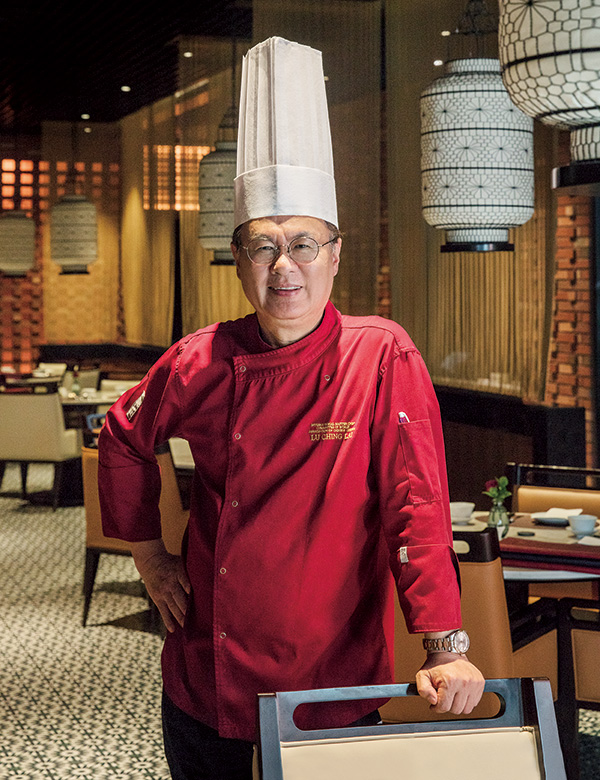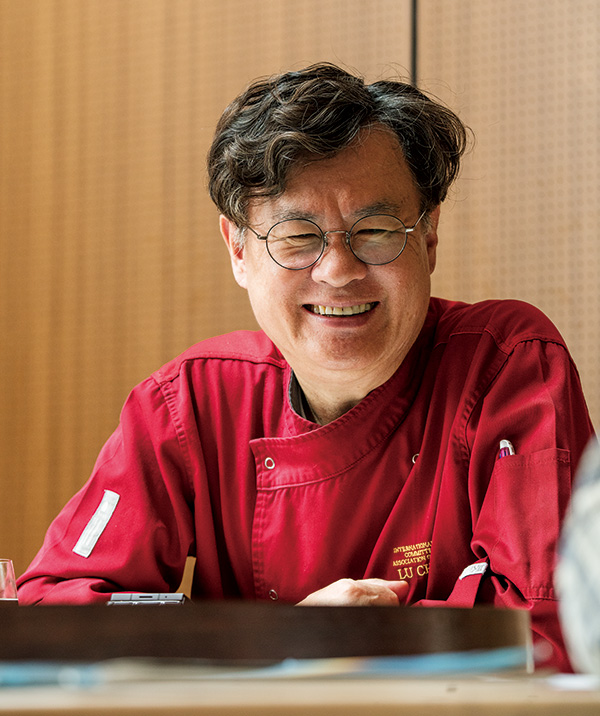in Issue & Trend
Fifty Years of Fire,
A Lifetime in a Single Dish
Chef Kyung-rae Yeo, Owner of Hongbogak

At fifteen, he stepped into a kitchen to earn a living. Half a century later, he’s recognized as a master chef by culinary communities around the world. He has cooked countless dishes over the past 50 years—but each of them received his utmost attention. This is the story of Chef Kyung-rae Yeo, a true icon of Chinese cuisine in Korea. In April, he joined FKI’s volunteer team to serve hot meals to victims of the wildfires in Yeongnam, delivering warmth through a single, heartfelt dish. We sat down with Chef Yeo, owner of Hongbogak, who has dedicated his life to cooking with sincerity.
By Hye-won Kim
Photographer Gyu-cheol Shin
You’ve walked a single path—Chinese cuisine—for five decades. A true master of the craft.
To be honest, I didn’t enter the field of Chinese cuisine with a grand ambition. If anything, I’d say I had no particular aspirations at all. Back then, the options available to ethnic Chinese living in Korea were limited. My mother suggested I learn a trade, and that’s how I ended up cooking. It was a very practical decision. I was fifteen. It was tough to start working at such a young age, but I had to endure to support my family.
Before I knew it, 50 years had passed. At some point, I began to feel that cooking was truly my calling. If you’ve spent half a century doing the same work, that must be what you’re meant to do. As the saying goes, it’s not the strong who survive, but those who survive who are strong.
You must have witnessed tremendous changes over the years. What’s the biggest difference between when you started and today?
Social perception has changed a lot. Back then, there was considerable prejudice against ethnic Chinese—and the same went for the culinary profession. It’s hard to imagine now, but people would hesitate to say, “I work at a Chinese restaurant.” That’s how things were. Today, the image of chefs has improved drastically. You see so many chefs on TV and YouTube, and it’s not uncommon to meet chefs who have studied abroad. I’m happy to have seen such positive changes during my career.
“At some point, I began to feel that cooking was truly my calling.
If you’ve spent half a century doing the same work, that must be what you’re meant to do. As the saying goes, it’s not the strong who survive, but those who survive who are strong.”
You’ve served as a judge for over 20 years in major culinary competitions, including Korea’s largest, the Lee Kum Kee Cooking Competition. I hear you’re also passionate about mentoring the next generation.
There’s a sauce brand called Lee Kum Kee that’s well known among those interested in Chinese cuisine. I’ve been serving as an advisor to the brand since 2005.
Once, while attending a Lee Kum Kee event in Hong Kong, I saw a cooking competition for young chefs. I was struck with admiration and thought: We need something like this in Korea to help advance Korean-Chinese cuisine. At the time, I was teaching at a university and giving serious thought to nurturing novel talent.
After returning to Korea, I drew on my judging experience at international competitions and launched the first Lee Kum Kee University Student Chinese Cooking Competition in 2007. Only four schools participated that year. But last year, at the 18th Competition, 888 students from 39 universities nationwide competed fiercely. I hope the competition continues to grow, producing new talent and advancing our local Chinese cuisine.
Last year, instead of serving as a judge, you surprised many by appearing as a contestant on the Netflix series Culinary Class Wars. Your showdown with Chef Tae-hoon Im was particularly moving, as you displayed the poise of a true master.
It’s a little embarrassing to hear it described as “the poise of a true master.” Even now, some people still recognize me and say they enjoyed watching Culinary Class Wars. I’m simply grateful they received it so kindly.
To be honest, at the time of filming, I thought it was all over once I was eliminated. Rather than feeling embarrassed or ashamed about losing to a junior chef, I was mostly relieved—“Finally, I can go home!” The battle had gone on until dawn, and since I had to report to work in the morning, I was completely exhausted. After the shoot, I put it out of my mind entirely. But to my surprise, once the show aired, the response was unexpectedly positive.
Many people told me that the moment when Chef Im bowed deeply—both when I was chosen as his opponent and again after he won—was especially moving. I was a bit flustered in that instant, but it also reminded me that Korea truly is a country that values respect. I felt a genuine sense of gratitude toward him. I think it was a scene that brought back something I had forgotten in the rush of everyday life.
As you once said, what truly remains in the end is not the outcome, but one’s skill and attitude.
In my experience, people don’t remember results for long. It’s best not to obsess over outcomes. What matters most is showing sincerity in every moment.
You’ve stepped back from day-to-day kitchen work and now serve as the owner-chef of Hongbogak. What are your thoughts on teamwork and leadership?
I turned 66 this year. Though I’ve occasionally appeared on TV and gave lectures to showcase cooking, I actually stepped away from hands-on kitchen work about ten years ago. That said, as the owner of a restaurant that bears my name, I continue to oversee the kitchen to ensure consistency in flavor.
One thing I’m proud of is my team. The chefs in Hongbogak’s kitchen have worked with me for anywhere from five to sixteen years. I hesitate to call it “leadership”—all I’ve done is treat them as individuals, with respect and sincerity. I also make it a point to offer praise and encouragement. Of course, it’s not always easy to speak kindly to someone who may be struggling with their performance. It takes a certain patience and calm. But I’ve found that it’s far more effective than scolding or shouting. If you try to understand each person’s temperament and strengths, and treat them as fellow professionals—and more importantly, as people—you build mutual trust. That’s what allows us to work together for a long time.

You’ve consistently taken part in charitable work, sharing your influence for good. Most recently, in April, you joined FKI and Youngone Corporation to serve Chinese cuisine to wildfire victims in Andong, Gyeongsangbuk-do.
I’ve long participated in community service as a way to give back for the help I received during my difficult youth. When the writer from Culinary Class Wars told me about FKI’s volunteer initiative, I didn’t hesitate for a moment. The situation was so severe that I felt I had to help. Seeing the area in person was even more heartbreaking. I joined the food-sharing event with the hope that it might offer some comfort. As someone who travels frequently for culinary events, I’m always happy to lend a hand whenever the opportunity arises.
You also serve as President of the Korean Chinese Cuisine Association and Vice President of the World Association for Chinese Cuisine. What’s your outlook on the future of Korean-style Chinese cuisine and the globalization of Korean food in general?
The key is localization. That’s always the main topic of discussion in our meetings. You can’t expect to go global while insisting on a fixed way of doing things.
Let me give an example. Even within Korea, kimchi tastes different depending on the region—there’s a central-style, a southern-style, and more. China is vast and ethnically diverse, so it’s impossible to define “Chinese cuisine” as a single entity. That’s why we refer to regional styles like Beijing, Shanghai, Cantonese, or Sichuan cuisine. Korean-style Chinese food is rooted in these traditions, but has evolved into its own distinct category—tailored to the Korean palate. In that sense, I have a very positive view of both the globalization of Korean-Chinese cuisine and of Korean food in general.
Some people tend to reject anything that doesn’t fit the mold, saying “That’s not Korean food” or “That’s not real Chinese cuisine.” But I believe we need to approach this with open minds—combining local ingredients and styles in creative ways. Flexibility and innovation are the most important ingredients for growth.
If you had to choose one dish that represents your culinary career, what would it be?
Without a doubt—jajangmyeon (black bean noodles). Of course, there are fancier dishes like palbochae or tangsuyuk, but jajangmyeon comes to mind first. It’s the most iconic dish in Korean-Chinese cuisine. People eat it on school entrance or graduation days, on moving day, and even on birthdays. For us chefs, jajangmyeon is a compelling dish to make. I can’t even count how many times I’ve cooked or eaten it over the past 50 years—and I still haven’t grown tired of it. To me, it’s a bowl that holds all the joys and sorrows of our everyday lives.
Finally, could you share any hopes or plans for the future?
At my age, I think it’s time to wrap up my career with dignity. I’ve spent so many years charging forward without looking back—now, I want to take things a little slower and focus on refining what I’ve built. I’ll continue to work in the kitchen for as long as my strength allows, and when the time comes, I hope to step down gracefully.
